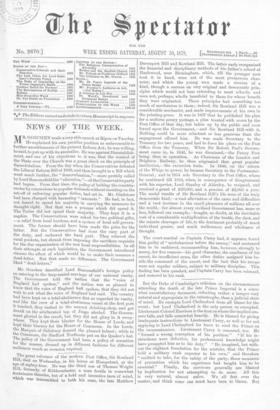The great reformer of the modern Post Office, Sir Rowland
Hill, died on Wednesday, in his house at Hampstead, at the age of eighty-four. He was the third son of Thomas Wright Hill, formerly of Kidderminster, a man fertile in somewhat doctrinaire theoriea, but of a bold and inventive turn of mind, which was transmitted to both his sons, the late Matthew
Davenport Hill and Rowland Hill. The latter early reorganised the financial and, disciplinary methods of his father's school at Hazlewood, near Birmingham, which, till the younger men took it in hand, were not of the most prosperous char- acter, and which the young men made a success of a kind, though a success on very original and democratic prin- ciples which would not bear extending to most• schools, and were not, perhaps, wholly beneficial to those for whose benefit they were originated. These principles had something too much of mechanism in them ; indeed, Sir Rowland Hill was a considerable mechanist, and made improvements of his own in the printing-press. It was in 1837 that he published his plan for a uniform penny postage, a plan treated with scorn by the Post Office of that day, but taken up by the public and soon forced upon the Government,—and Sir Rowland Hill with it. Nothing could be more reluctant or less generous than the engagement offered him. He was made Secretary to the Treasury for two years, and had to force his plans on the Post Office from the Treasury. When Sir Robert Peel's Govern- ment came in, in 1842, he was dismissed,—the Penny Post being then in operation. As Chairman of the London and Brighton Railway, he then originated that great popular institution,—the excursion train. In 1846, on the return of the Whigs to power, he became Secretary to the Postmaster- General ; and in 1854 sole Secretary to the Post Office, where he continued till 1864, when, in consequence of disagreement with his superior, Lord Stanley of Alderley, he resigned, and received a grant of £20,000, and a pension of £2,000 a year. The social results of Sir Rowland Hill's life were of the truly democratic kind,—a vast alleviation of the cares and difficulties and a vast increase in the small pleasures of millions all over the world,—for almost every civilised Government has, more or less, followed our example,—bought, no doubt, at the inevitable cost of a considerable multiplication of the bustle, the dust, and the minute cleavages of life, to the detriment probably of much individual genius, and much mellowness and wholeness of thought.






























